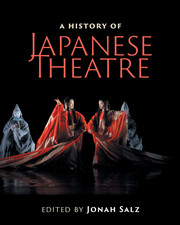Book contents
- Frontmatter
- Contents
- List of figures
- List of tables
- Contributors
- Contributors’ biographies
- Foreword
- Acknowledgments
- Note on Japanese terms
- List of abbreviations
- Timeline
- Editor's introduction
- I Traditional theatres
- Preface to Part I Japanese civilization arises
- II Modern theatres
- Preface to Part II
- 6 Birth of modern theatre: shimpa and shingeki
- Interlude Modern comedies and early musicals
- Interlude Takarazuka: all-girls’ revue and musicals
- 7 Rise of shingeki: Western-style theatre
- Interlude Manzai and Yoshimoto vaudeville comedy
- 8 Wartime colonial and traditional theatre
- Interlude Kami-shibai: picture-card storytelling
- 9 Maturing shingeki theatre
- Interlude Postwar musicals and commercial theatre
- 10 Sixties Theatre
- Interlude Butoh: dance of darkness and light
- 11 Contemporary theatre
- Interlude Tokyo: world theatre capital
- Interlude Charting Tokyo theatre today: 24 November 2012
- Interlude Modern theatre tomorrow: interview with Oriza Hirata
- III Arcs and patterns
- IV Theatre architecture
- Preface to Part IV Evolution of Japanese theatre architecture
- V Theatre criticism
- VI Intercultural influences
- Epilogue: Frozen words and mythology
- Further reading
- Index
- References
Interlude Modern theatre tomorrow: interview with Oriza Hirata
from Preface to Part II
Published online by Cambridge University Press: 05 July 2016
- Frontmatter
- Contents
- List of figures
- List of tables
- Contributors
- Contributors’ biographies
- Foreword
- Acknowledgments
- Note on Japanese terms
- List of abbreviations
- Timeline
- Editor's introduction
- I Traditional theatres
- Preface to Part I Japanese civilization arises
- II Modern theatres
- Preface to Part II
- 6 Birth of modern theatre: shimpa and shingeki
- Interlude Modern comedies and early musicals
- Interlude Takarazuka: all-girls’ revue and musicals
- 7 Rise of shingeki: Western-style theatre
- Interlude Manzai and Yoshimoto vaudeville comedy
- 8 Wartime colonial and traditional theatre
- Interlude Kami-shibai: picture-card storytelling
- 9 Maturing shingeki theatre
- Interlude Postwar musicals and commercial theatre
- 10 Sixties Theatre
- Interlude Butoh: dance of darkness and light
- 11 Contemporary theatre
- Interlude Tokyo: world theatre capital
- Interlude Charting Tokyo theatre today: 24 November 2012
- Interlude Modern theatre tomorrow: interview with Oriza Hirata
- III Arcs and patterns
- IV Theatre architecture
- Preface to Part IV Evolution of Japanese theatre architecture
- V Theatre criticism
- VI Intercultural influences
- Epilogue: Frozen words and mythology
- Further reading
- Index
- References
Summary
Oriza Hirata (1962–) is playwright, director, owner of Komaba Agora Theatre, and leader of the Seinendan (Youth Group) Theatre Company based in Tokyo. With Sōru Shimin (Citizens of Seoul, 1989), he established “Contemporary Colloquial Theatre Theory” which, in contrast to Western-influenced shingeki, bases its grammatical structure on everyday Japanese: pronouns omitted, verbs repeated, and stress accents discarded; long pauses and simultaneous chitchat. His Tokyo nōto (Tokyo notes, 1994; Figure 47) received the Kishida Kunio Drama Award, and was consequently produced in Brest, France (directed by Frédérick Fisbach). His productions have regularly been invited to theatres around the globe, most recently with his “android theatre.”
Hirata has published highly debated theoretical books such as Gendai kōgo engeki no tame ni (Approaching contemporary colloquial theatre, 1995) and Toshi ni shukusai wa iranai (Cities need no festivals, 1997) strenuously arguing about the development of the ever-contentious modern Japanese theatre scene from historical, aesthetic, and above all linguistic perspectives. In this interview, held on 9 December 2012, Hirata was asked to discuss Japanese contemporary theatre in the context of wider international markets, describing how creative shifts by the younger generation may lead to a “theatrical evolution from the periphery.”
Native theatrical language
Hirata foresees the future by casting his eye over the past. His initial argument is that the struggle of Japanese drama to create a modern, native, theatrical language per se began during the anomalous and arbitrary development of shingeki. At the beginning of the twentieth century, Japan imported Shakespeare, Ibsen, Chekhov, and Maeterlinck almost simultaneously, eliding cultural specificities in favor of importing texts and staging from Western masterpieces. Thus, when Japanese playwrights and directors attempted to develop their own dramaturgical equivalents in Japanese settings, they inevitably achieved perplexing results: attempting to match European language locutions, dialogue often became stilted and remote. This was anathema to Hirata; from early in his career, he criticized the “unnatural” language of shingeki.
Hirata asserts that compared to Japan's successful integration of Western modern music, Japanese theatre, to which the modernization movement came late, never had time to fully digest Western dramaturgical traditions. By the 1930s Japan had entered its fascist era and arguably any cultural evolution was neglected except those directly accommodating the military and colonial project.
- Type
- Chapter
- Information
- A History of Japanese Theatre , pp. 358 - 364Publisher: Cambridge University PressPrint publication year: 2016



